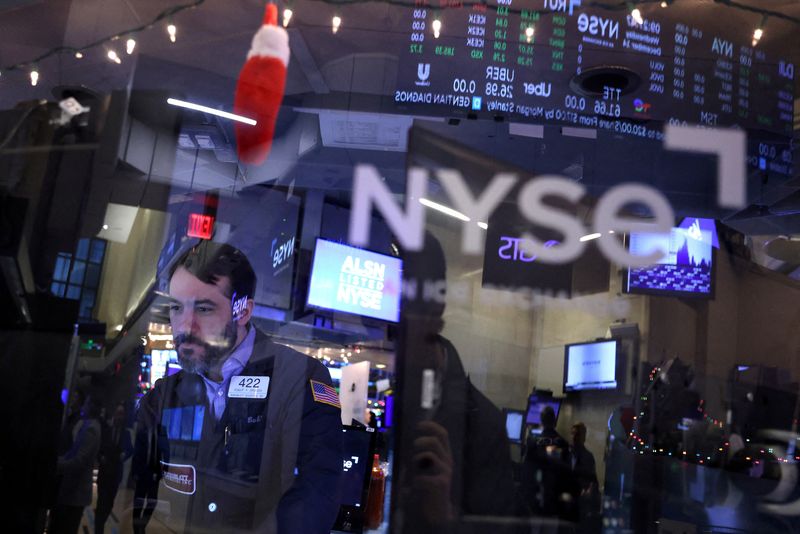By Lewis Krauskopf
NEW YORK (Reuters) - U.S. stock investors could not be more eager to turn the page on 2022, a brutal year dominated by market-punishing Federal Reserve rate hikes designed to tamp down the steepest inflation in 40 years.
The S&P 500 is down nearly 20% year-to-date with only a few trading days left in 2022, on pace for its biggest calendar-year drop since 2008. The carnage has been even more severe for the Nasdaq Composite, which had tumbled by nearly 34% so far for the year.
High-profile casualties include the once-soaring shares of Amazon.com Inc (NASDAQ:AMZN), which have slumped around 50% this year, while those of Tesla (NASDAQ:TSLA) Inc are down some 70% and Facebook parent Meta Platforms Inc (NASDAQ:META) shares have lost about 65%. Meanwhile, energy stocks have bucked the trend by posting eye-popping gains.
GRAPHIC: S&P 500 timeline (https://fingfx.thomsonreuters.com/gfx/mkt/jnvwyyzxlvw/Pasted%20image%201671815877097.png)
Inflation, and the Fed's degree of aggressiveness in trying to contain it, will likely remain a critical factor driving equity performance as 2023 gets under way. But investors will also be watching for fallout from higher interest rates, including how tighter monetary policy ripples through the economy and whether it makes other assets more competitive with stocks.
Here is a look at some of the big themes for the U.S. stock market in 2023.
RECESSION OR SOFT LANDING?
Perhaps the biggest question that will sway stocks as the new year begins is whether the economy is headed for a recession, as many investors are expecting.
If a recession starts next year, stocks could be set for another slide: A bear market has never bottomed before the beginning of a recession, historic data showed.
Recessions tend to hit stocks hard, with the S&P 500 falling an average of 29% during recessions since World War Two, according to Truist Advisory Services. Those declines, however, have usually been followed by a strong rebound.
GRAPHIC: S&P 500 return around recessions (https://www.reuters.com/graphics/USA-STOCKS/YEAREND/klvygglnzvg/chart.png)
PROFITS AT RISK?
Investors are also concerned that corporate earnings estimates may not have fully factored in a potential slowdown, leaving more downside for stocks.
Consensus analyst estimates project S&P 500 earnings to rise 4.4% in 2023, according to Refinitiv IBES. Yet earnings fall by an average annual rate of 24% during recessions, according to Ned Davis Research.
GRAPHIC: S&P 500 earnings, annual change (https://www.reuters.com/graphics/USA-STOCKS/EARNINGS/xmvjkkxrgpr/chart.png)
GOODBYE, TINA?
The Fed’s rate hikes have pushed up bond yields and created competition for equities, flying in the face of the low-yield environment that predominated for more than a decade and gave rise to the acronym “TINA,” or “there is no alternative” to stocks.
Yields on the 10-year Treasury Inflation-Protected Securities (TIPS) - also known as real yields because they strip out projected inflation - recently stood at around 1.5%, after hitting their highest level in over a decade in October.
Still, some investors have noted that stocks fared well in past periods when yields were even higher.
GRAPHIC: Rising US Treasury yields and stock performance (https://fingfx.thomsonreuters.com/gfx/mkt/akveqqrqrvr/Pasted%20image%201671810534893.png)
CAN VALUE VAULT AHEAD?
In the past year, value stocks - commonly defined as those trading at a discount on metrics such as book value or price-to-earnings - held up better than tech and other growth shares, reversing trends that had been in place for much of the past decade.
With higher yields and doubts about profit growth standing to pressure tech and growth stocks, the question is whether value - which is more heavily represented by financial, energy and defensive groups - could be poised for another year of outperformance.
GRAPHIC: Value vs growth stocks (https://fingfx.thomsonreuters.com/gfx/mkt/dwvkddnagpm/Pasted%20image%201671812227524.png)
DOLLAR MAKING A DENT
The dollar’s surge against other currencies this year hurt the earnings of many U.S. companies, making it more expensive for multinationals to convert their earnings back into their home currency.
The greenback has pared some of those gains in recent weeks and a continued reversal would depend in part on investor perceptions of how hawkish the Fed will be relative to other global central banks.
GRAPHIC: FX pain (https://www.reuters.com/graphics/USA-STOCKS/egpbyyblqvq/chart.png)
